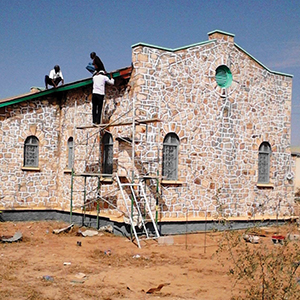The Church has re-established a visible presence in Muslim-majority Somalia for the first time in almost three decades, with the building of a parish church.
Somalia has been blighted by anarchy, famine, civil war and terrorism since the dictator Siad Barre was deposed in 1991. The Vatican has not appointed a bishop there since the assassination of the Bishop of Mogadishu, Pietro Salvatore Colombo, inside his cathedral in July 1989.
However, in early August, with no fanfare, Bishop Giorgio Bertin of Djibouti, the apostolic administrator of the capital Mogadishu and the whole of Somalia, opened and consecrated the St Anthony of Padua church in Hargeisa. The city is effective capital of the semi-autonomous region of Somaliland, a former British protectorate.
The bishop said there was a change in the country and the Hargeisa church was officially recognised by Somaliland authorities. “I have a permanent priest there. So there is a little sign of presence in some parts of Somalia, but not in Mogadishu at present. It is still not too easy because of insecurity,” Bishop Bertin told The Tablet in an interview in Nairobi. He said the Hargeisa church was able to operate, but was remaining “discreet and humble”. “This is a sign hope for Somalia,” he said.
The murder of Bishop Colombo heralded the end of the church presence in the Horn of Africa country. Catholic missionaries were forced to depart after the fall of Barre, and the last three nuns running a hospital left in 1998, after the kidnapping at gunpoint of another sister.
Turning to the Nairobi Government’s decision to close Dadaab, the vast refugee camp in north-eastern Kenya that accommodates 280,000 refugees, mostly Somalis, Bishop Bertin advised caution over the movement of the refugees. Kenyan troops are operating against the Islamist militant group al-Shabaab in Somalia and the Government believes the militants have infiltrated the camp. But Bertin warned that the refugees could find themselves unwelcome in their former home. “I know Kenya authorities would like to see them back in Somalia, but it is necessary to see there is a kind of welcoming attitude on the other side,” he said.
29 September 2016, The Tablet
Catholic church built in Somaliland
 Loading ...
Loading ...
Get Instant Access
Subscribe to The Tablet for just £7.99
Subscribe today to take advantage of our introductory offers and enjoy 30 days' access for just £7.99



